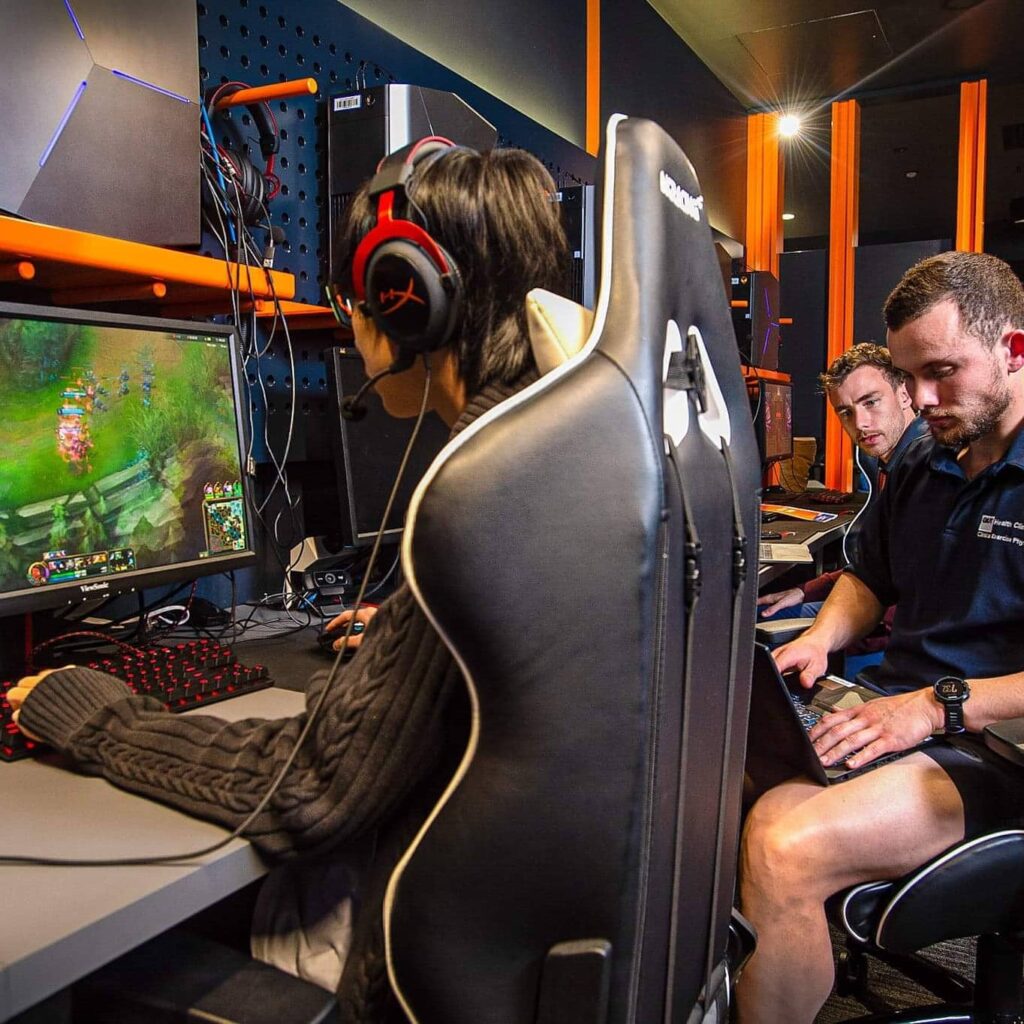Mitchell Nicholson is PhD student at Queensland University of Technology in Australia – Investigating the physiological demands of competitive Esports
Connect with him on Linkedin , Instagram or Twitter and you email him at: mitchell.nicholson@hdr.qut.edu.au
There is very little research into the physiological demands of esports and there are currently no studies that investigate the role of exercise within this population. Esports is completely sedentary and poses a large cognitive demand on the athletes through the utilisation of many mental abilities (1, 2), with mounting evidence highlighting the importance of enhanced cognitive abilities for successful esports performance(3). There is extensive research showing that an increase in physical activity improves several domains of cognitive function, such as, working memory, sustained attention, response inhibition, and reaction time to name a few(4). This research might provide the industry with a cost-effective strategy to not only improving the health and well-being of athletes but also their competitive performance.
So far, I have done some pilot work with the Queensland University of Technology (QUT) Tiger’s League of Legends Esport team whilst preparing for the Oceanic Challenger Series. This study investigated the heart rate variability (HRV) of these players(5) during a competitive scrimmage. This data will allow for a greater understanding between autonomic nervous system regulation and cognition within these players. The players who self-reported higher weekly physical activity displayed a lower resting HR and decreased HRV during in-game situations, when compared to their teammates reporting minimal weekly physical activity. This suggests that physical activity may be a significant moderator to HRV within these athletes, although the direct role of exercise needs to investigate further.
Photo – Dylan Poulus and Mitchell Nicholson investigating the HRV of LoL Esports athletes
Within my Ph.D. I have plans to complete three studies that look to investigate the physiological and cognitive demand of competitive gameplay, as well as the role of an exercise intervention on cognitive performance. A web-based survey will be implemented through various forums and social media to target a wide group of Esports players. It will look to quantify physical activity within this population, their current beliefs towards exercise, how they perceive exercise may influence their in-game performance, common motivators and barriers towards exercise, and their current exercise schedule/delivery methods. I will also look to quantify energy expenditure of competitive gameplay, as well as HRV and actions per minute. This will be done through the measurement of resting metabolic rate and energy expenditure during gameplay, which may benefit competitive performance through a greater understanding of the physical and psychophysiological demand of the sport. This will also expand on the previous pilot-study and delve deeper into the HRV of esports athletes under competitive competition. We will also investigate the role of an exercise intervention on blood haemoglobin saturation of the brain, cognitive function, and HRV within Esports athletes. Haemoglobin is the protein within our blood that carries oxygen, with greater cerebral blood saturations linked to enhanced cognitive performance(6). Individuals with higher fitness levels also display faster reaction times, improved results within executive domains and greater cerebral oxygenation when compared to individuals with lower fitness levels (7). Although, this has never been investigated within Esports athletes and may be one of the first studies to link exercise and cognitive function within the industry.
I hope my research can help inform and inspire future researchers within the industry to build a greater understanding into the physiological demands of the sport, as well as methods to improving competitive performance. This may also demonstrate the importance of researchers and performance coaches to gaming organisations in gaining the competitive edge over their rivals. There is a very exciting future for Esports research and the entire industry ahead!
ORCID iD: https://orcid.org/0000-0001-5058-0435
References
- Kowal M, Toth AJ, Exton C, Campbell MJ. Different cognitive abilities displayed by action video gamers and non-gamers. Journal of Computers in Human Behavior 2018;88:255-62.https://doi.org/10.1016/j.chb.2018.07.010
- Himmelstein D, Liu Y, Shapiro JL. An Exploration of Mental Skills Among Competitive League of Legend Players. International journal of gaming and computer-mediated simulations. 2021;9(2):1-21.https://doi.org/10.4018/IJGCMS.201704010
- Toth AJ, Ramsbottom N, Kowal M, Campbell MJJBs. Converging evidence supporting the cognitive link between exercise and esport performance: a dual systematic review. 2020;10(11):859.https://doi.org/10.3390/brainsci10110859
- Sun X, Li Y, Cai L, Wang YJPr. Effects of physical activity interventions on cognitive performance of overweight or obese children and adolescents: a systematic review and meta-analysis. 2021;89(1):46-53.https://doi.org/10.1038/s41390-020-0941-3
- Nicholson M, McNulty C, Poulus D. Letter in response to review: More physiological research is needed in Esports. International Journal of Esports. 2020;1(1):1-6
- Herold F, Wiegel P, Scholkmann F, Müller NGJJocm. Applications of functional near-infrared spectroscopy (fNIRS) neuroimaging in exercise–cognition science: a systematic, methodology-focused review. 2018;7(12):466.https://doi.org/10.3390/jcm7120466
- Dupuy O, Gauthier CJ, Fraser SA, Desjardins-Crèpeau L, Desjardins M, Mekary S, et al. Higher levels of cardiovascular fitness are associated with better executive function and prefrontal oxygenation in younger and older women. 2015;9:66.https://doi.org/10.3389/fnhum.2015.00066

